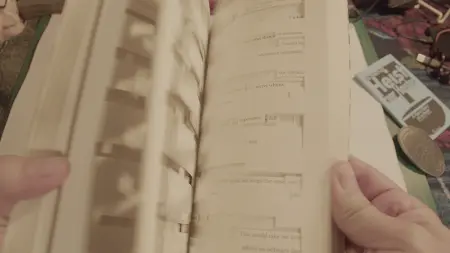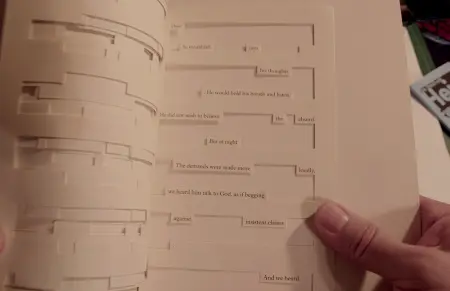Photos by Peter Derk
Let’s take a moment to talk carnivals. I promise that this relates to Tree of Codes by Jonathan Safran Foer.
When you walk through the aisles of food stands, the section of a carnival for people like me, people with taste, you might come across walking tacos. This is the name given to a dish where you basically put a taco, minus tortilla, into a bag of Doritos, smash it all up, and then eat it with a fork.
If you’ve never eaten this, I highly recommend it.
After your walking taco, you have a fried Oreo, or fried Coke, or fried butter. All of them basically taste like fried, which means they all taste great.
Then you come across a sideshow, and in this sideshow, Oddities From The Book World.
If someone took the time to put together Oddities from the Book World, Jonathan Safran Foer's Tree of Codes would surely be on display.
What Is It?

Tree of Codes is a book that’s made from another book, Street of Crocodiles by Bruno Schulz.
What Jonathan Safran Foer did is chop 90% of the words contained in Street of Crocodiles in order to create a new story with what remains.
You can think of it a little like the blackout poetry thing, but the difference is in the presentation. Instead of words marked out with black, or simply omitted entirely, Tree of Codes is a book created by actually, literally cutting words out of Street of Crocodiles.
Each page is more hole than it is words.
The words that remain tell their own tale, completely separate from the story in Street of Crocodiles.
You know how a sculptor might say they didn’t carve a statue, they just took a block of stone and removed the parts that weren’t the statue? That’s kind of what’s going on here, except the Tree of Codes statue is carved from the larger Street of Crocodiles statue. Foer just removed the parts of Street of Crocodiles that weren’t Tree of Codes.
How Do You Read It?
When I got this book, I couldn’t tell if you read through the little windows or what, but it turns out you read it pretty much like a normal book, one page at a time.
Some people do this by putting a sheet of blank paper between the pages as they go. I didn’t find this necessary, but there’s a helpful hint for you.

I was kind of disappointed at first because I thought this was a more intricate, complicated design. But it worked out once I got into the book itself.
What’s the Story Contained in Tree of Codes?
I’m not sure I could say exactly, it’s more lyrical than it is a hardboiled mystery or something, but it seems to be a story of a family, loss, you know, stuff that’s in classic novels.
If I can be artsy and obnoxious and also take a shot at using vocabulary more comfortable in the mouth of a younger person than I am, it’s more of a vibe than it is a tightly plotted A to B kind of thing.
Bullshitty Gimmick Or Good Book?
Yes, both.
Let’s start with this: I enjoyed the book. I did feel feelings while reading it, feelings other than frustration or annoyance. It was effective on that level.
It’s a reading experience I would recommend.
Now, the details.
Brief
Tree of Codes is maybe a 30-minute read, depending on how much trouble you have fumbling around with the book itself.
Foer got this right: No gimmick is so good that it’ll create infinite patience in the reader.
Tree of Codes gets an invite to the reading party at my house because of its unusual format. And Tree of Codes is aware of that, and it doesn't overstay its welcome.
Artsy Fartsy Part 1
I tend read fast, I end up skimming too much, and this book kind of refuses to let that happen.
And I think the gimmick is what slows you down. You need two hands to read this book, it demands your attention in a physical way that most books don’t.
It's a non-narrative, physical world way to slow the reader down, and for me, it worked.
Artsy Fartsy Part 2
There's something to the idea of stories within stories and seeing a favorite novel as a whole world, something that contains lots of stories.
If it was Foer’s goal to demonstrate how there are always stories within stories, to the extent that you can remove 90% of an original story and come out with a mostly-formed, entirely new story, his demonstration works.
Survival Mechanism
One thing I like about digital books is that they are pushing people to try new things in print. “Okay, digital books are super convenient and portable. What’s a new kind of print book I could make?”
I’m into it. I’m for it.
It’s kind of weird that books have been around as long as they have, and we have so few alternative formats to the straightforward, top to bottom novel.
Which means I'm forgiving of unusual books in ways I might not be of more typically-formatted stuff.
The Sideshow
Now we come back to that carnival nonsense from the intro above. This is the part of the column known as THE PRESTIGE! Or maybe THE ILLUSIONIST. I can never remember which of those movies I saw. Whatever, this is where the magic happens.
One complaint levied at walking tacos is that they are not authentic tacos.
By the standards of taco authenticity, walking tacos are questionable. The beef is usually underseasoned and wouldn’t pass muster, I think a tortilla of some kind is a pretty key component of what makes a taco a taco, and that's missing.
But the walking taco IS authentic carnival food. It checks the boxes: It’s a little weird, it’s intriguing, it’s probably not all that good for you, and you’re at the carnival, trying to have a carnival experience as opposed to having an authentic dining experience.
And that’s the question we’re really asking here: Is Tree of Codes an authentic experience, not by the standards of typical books, but in the world of books as sideshow?
It is.
It’s strange, it’s intriguing, and even though it’s not 100% successful, like if you broke down its elements, wrote this out as a normal book, it probably wouldn’t satisfy, it works.
Tree of Codes works as sideshow, its intended context.
Should You Go Out And Buy "Tree of Codes"?
Unless “go out” means “hop in your time machine,” which would allow you to buy it for the original cover price, I’d say no.
Because it’s fairly pricey on eBay.
That said, don't pass on checking it out because it's expensive. Instead, get Tree of Codes on interlibrary loan from your library. These services are usually free or VERY low cost.
Read Tree of Codes, experience it, and then decide whether you want to own it.
I think it's more important to experience this book than it is to acquire it.
And for your own sake, if you've never dumped the contents of a taco into a Doritos bag, do that, too.
Get We Are the Weather: Saving the Planet Begins at Breakfast by Jonathan Safran Foer at Bookshop or Amazon
Get Bookshelf (Object Lessons) by Lydia Pine at Bookshop or Amazon

About the author
Peter Derk lives, writes, and works in Colorado. Buy him a drink and he'll talk books all day. Buy him two and he'll be happy to tell you about the horrors of being responsible for a public restroom.








